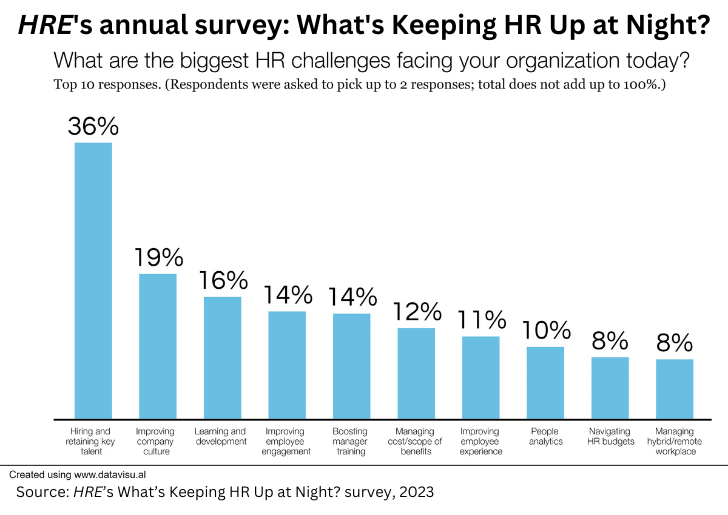Any HR leader today would likely agree: Recruiting and retaining top talent is their most pressing priority. In fact, it’s a reality that has held true for several years, according to HRE’s annual What’s Keeping HR Up at Night? survey. However, as economic and market conditions change, employers aren’t as singularly challenged by recruiting and retention—which, experts say, could suggest increasing opportunities to strategize for long-term people success.
The survey of more than 350 HR leaders conducted in late 2023 found that about 36% cited recruiting and retaining key talent as their top challenge, compared to 47% last year. While making the right hiring decisions is still, far and away, HR leaders’ biggest focus, the findings suggest the pressure may be easing slightly; the 2022 survey, for instance, found that 72% of respondents were somewhat or extremely concerned about losing talent in the next year, compared to about 62% in 2023.

Mark Stelzner, founder and managing principal at IA and chair of the upcoming EPIC Conference, says recruiting and retaining talent will “always be a top priority for HR.” While the pandemic and Great Resignation largely colored HR’s recruiting and retention challenges in the last few years, today, Stelzner says, his firm is seeing leaders increasingly refine how they think about the challenge of hiring and keeping talent.
“For example, there is a material distinction between the high-volume recruiting that is needed to maintain the business versus the high-value recruiting/retention that is needed to advance or grow the business,” he says.

Related: Join HRE and Stelzner in Las Vegas this spring for our EPIC (Elevate People, Ignite Change) conference, where you can learn from experts and fellow practitioners about using innovation and transformation to positively influence your people strategies.
A slower hiring market and uncertain economy are likely among the factors fueling the slightly decreased emphasis on recruiting and retention, adds Mimi Turner, vice president of the Executive Search practice at the Institute for Corporate Productivity (i4cp). However, companies seeking to be on the leading edge of recruiting and retention may also be increasingly looking at the undercurrents that help them score and keep talent in the future of work.
“Companies that will be ahead of this in 2024 are looking at things holistically,” Turner says. “They’re going to be taking a look at reskilling and the deconstruction of jobs into skills. Companies today are going to be looking to empower their current talent in ways they’ve never done before.”
Skills for the future
The survey results bear this out, suggesting that, with a less frenzied recruiting and retention focus, HR is increasingly looking to develop talent for the future of work—particularly when it comes to leadership.
Building company culture (19%) and learning and development (16%) again ranked second and third among challenges, rising 1 and 3 percentage points, respectively. These were followed by improving employee engagement and boosting manager training, the latter of which jumped a spot and increased by several percentage points.
When asked where they are spending most of their time, nearly 30% of HR leaders cited leadership development, particularly manager and supervisor training, followed by employee experience and engagement—and then recruiting. Leadership training was also the top-cited strategy for reducing turnover in the next year, with 60% of respondents saying they’re investing in this area—more so than company culture, employee listening and compensation.
A number of factors are driving HR to lean into leadership learning, says Hannah Yardley, chief people and culture officer at employee recognition software provider Achievers.

Ongoing economic challenges—coupled with global geopolitical crises—are causing employee stress and burnout to spike. Managers and leaders are key to helping individual contributors build resilience and remain engaged, Yardley says, but they need to be properly trained. This may necessitate a “complete” overhaul of manager onboarding and upskilling, but “it is well worth the effort,” she says.
“Investing in managerial training is crucial to boosting productivity and navigating the challenges effectively,” Yardley says, noting leadership should prioritize training managers in areas like communication, time management and leadership skills. “Equipping managers with the necessary tools and skills to lead remote and hybrid teams, foster motivation and mitigate distractions will significantly impact overall productivity.”

Pat Wadors, chief people officer at HR and workforce management solutions provider UKG, says managers and leaders have an “outsized impact” on everything from employee engagement to employee wellbeing—and are the “key lynchpin” in helping organizations bring to life the employee value proposition.
In a recent i4cp study—based on surveys of its board members, who include CHROs, chief diversity officers, chief learning and talent officers, and other HR leadership roles—CHROs’ top priority for 2024 is “training leaders at all levels to establish trust, exemplify the organization’s values and lead in new and evolving work structures.”
However, recent research from Achievers Workforce Institute finds that managers and leaders aren’t necessarily prepared to deliver on that potential. While just 1% of HR leaders surveyed by AWI said their organization lacks training for managers, 19% of managers said they have never received training.
“There’s a gap between the support HR leaders think they provide and what managers say they receive,” Yardley says.
‘Architects of culture’

Heather Vogel, chief talent officer at Children’s Home Society of Florida and a 2023 inductee to HRE’s HR Honor Roll, says her organization is focusing this year on strengthening the employee experience, which it is tying to cultural transformation. Central to that work will be personalizing the experience—from more user-friendly technology to inclusion initiatives—and managers will be key to that effort.
“We know that the true architects of our organizational culture are our supervisors,” Vogel says. “So, we’ll be doing some heavy lifting with them to gain the skills they need to foster team cohesion—which will help to keep their team healthy and whole through what looks to be a year filled with major change and transformation in both CHS and the communities we serve.”
Bristlecone, a provider of AI-powered transformation services for the digital supply chain, is also in the midst of transforming the role managers play in driving retention. Lisa Lesko, chief people officer at Bristlecone, says that, after recording its highest-ever rate of attrition at the height of the Great Resignation, the organization learned—through a robust employee listening strategy—that employees felt they lacked a connection to their managers.
In response, leadership worked closely with managers to have them assess the departure risk of each of their employees as part of an initiative called HiNgage, which gives managers more ownership over employee retention.

“This successful initiative ensured proactivity and accountability among managers and their role in retaining their team members,” Lesko says. “With this, managers became more effective in meeting the needs of their employees, as well as overall business strategies and goals of the organization.”
Ultimately, Bristlecone reduced its attrition rate from 27% to 12%.
The organization has worked to emphasize that “being a manager,” Lesko says, “is not just about driving results—it’s also about needing to understand what’s motivating, engaging employees—and putting an action plan in place.”
Such strategies can be part of an overarching effort to look at recruiting and retention holistically—to get to the root of pain points before they develop and cause lasting organizational damage.
“A lot of leaders will say, ‘Oh, recruiting and retention are important,’ but how important?” says Turner of i4cp. “Many people don’t understand that the hiring and rehiring cycle creates a lot of burnout and it has cultural implications. Companies need to get ahead of it and think about the whole employee lifecycle—from hire to retire.”

